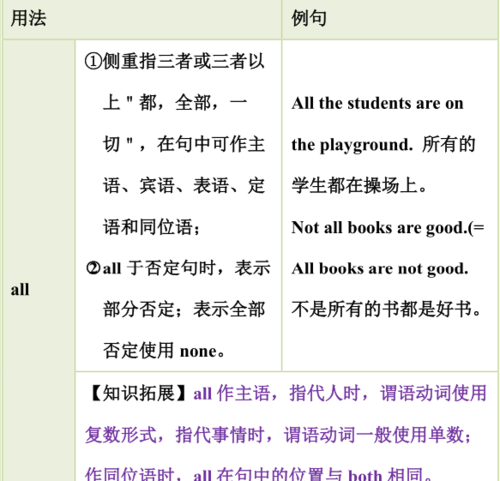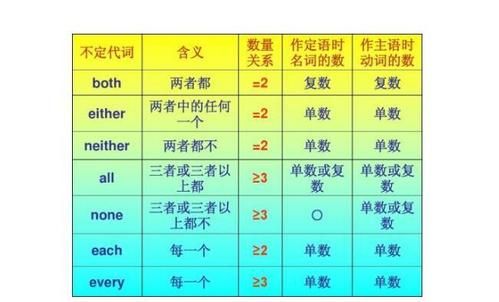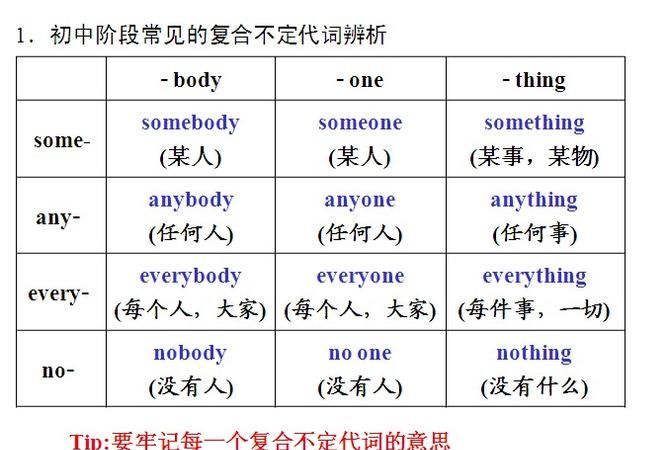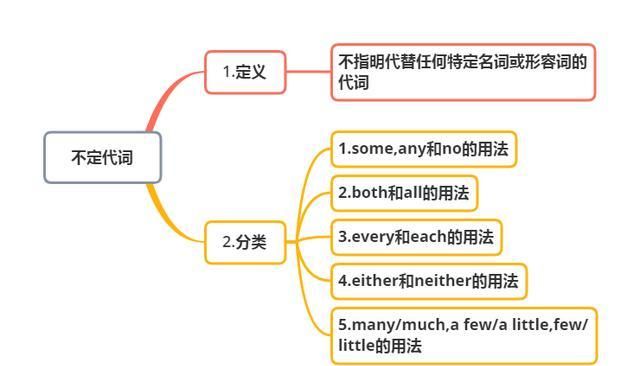本文目录
初中英语不定代词讲解
other 是一个形容词,可用来修饰名词
比如:I like red ,but other people like green in our classroom.
others 是一个代词,代替同一类事物中,剩余的一部分,而不是全部
比如:There are lots of flowers,some are red ,others are yellow.
another 意思是 另一个,指三个或三个以上中的另一个 ,常用来修饰单数
比如:The coat is small for me ,can I try on another one.
the other常和one连用,表示一个另个
比如 I have two pens ,one is red ,the other is blue.
the others也用来代替前面提到的事物,但代替的是全部
比如:There are sixty students in our class,the number of girls is thirty ,the others are all boys

不定代词用法总结表格
一、one,some,any的用法
1. one可泛指任何人或物,它还可以用在this,that的后面用来代替前面出现过的可数名词。其复数形式为ones;所有格形式是one’s;反身代词是oneself。如:
One should love one’s country.
These apples are too small. Give me some bigger ones.(ones替代前面的apples)
2. some和any通常用作定语,修饰可数名词或不可数名词。some修饰单数名词时,通常表示不确定的含义,意为“某个”。如:
Some boy is waiting for you now.
3. some用于疑问句中,表示邀请或请求,或希望对方给予肯定的答复。如:
Would you like some tea? (表示邀请)
Can I have some water? (希望得到肯定答复)
二、each和every的用法
1.each强调个别,可在句中充当主语、宾语、定语和同位语。every则强调整体。
2.each可表示两个或两个以上中的“每一个”,而every则要表示三者或三者以上中的“每一个”。如:
There are trees and flowers at each side of the road.
Every student in our class works hard.
三、no one与none的用法
no one 意为“没有人”,只能指人,不可指物。常用于回答who引导的问句。它不可与介词of连用。如:
—Who is in the classroom?
—No one.
none既可指人,也可指物。它强调数量,意为“一点也不,一个也不”。常用于回答how much和how many引导的问句。none还可与介词of连用。与of连用时,通常指“三者以上的人或事物中没有一个”。如:
—How much water is there in the bottle?
—None.
They were all tired, but none of them would stop to have a rest.
四、other和another的用法
1.other表示泛指,意为“另外的、别的、其它的”。常与复数名词或不可数名词连用。如果其前有the,this,some,any,each,every,no,one以及形容词性物主代词时,其后就可接单数名词。注意下面other的几种变形:
others:它是other的复数形式,表示泛指,意为“别的人或物”,但不指全部。如:
Many students are playing on the playground. Some are playing football;others are playing basketball.
the other:表示两者中的另外一个。可单独使用,也可后接单数名词。如:
The old man has two sons. One is a worker,the other is a teacher.
但如果the other后接复数名词或者the other本身用复数形式 (the others),都可表示其余的全部。如:
We shall do some cleaning this afternoon. Group One will clean the wall. Group Two will clean the windows. The other students will sweep the floor.
2. another常用于指三者或三者以上中的“另外一个”。它可单独使用,也可后接名词。如果其后接复数名词,则表示“又、再、还”。如:
This cap is too small for me. Show me another (one).
We need another three assistants in our shop.
五、all和both的用法
这两个词都可表示“都”,但all表示三者或三者以上的人或物,both则表示两个人或物。它们都表示肯定意义,但如果它们与not连用时,则表示部分否定。如:
All of them are middle school students.
His parents are both teachers.
Both of his parents aren’t workers.
All of the students aren’t here on time.
六、neither和either的用法
这两个词都可用于表示两个人或物。neither表示否定意义�意为“(两者中的每一个)都不”;而either则表示肯定意义,意为“(两者中的每一个)都”。它们用作代词时,可单独使用,也可同介词of连用。用作形容词时,则可用于修饰后面的单数名词。如:
Neither of them can speak Chinese.
Either of them can speak Chinese.
There are trees on either side of the street.
There are trees on neither side of the street.
七、few和little的用法
few用作不定代词时,可用于替代可数名词,表示否定意义。表示肯定意义时,则要用a few。 此外,few还可用作形容词,用于修饰可数名词。如:
Few students in this school can speak Japanese.
There are still a few students in the classroom.
little用作不定代词时,用于代替不可数名词,表示否定意义。表示肯定意义时,要用a little。用作形容词时,则要修饰不可数名词。如:
He is now out of work and can earn little money.
I can speak a little French.
从以上讲解我们可以看出,在使用不定代词时,一要注意它们的词性(因为它们还可用作形容词);二要注意它们所表示的数量;三要注意它们是表示肯定还是否定。只有这样,才能用好不定代词。

不定代词后面加什么
不定代词指的是那些不指明代替任何特定名词或形容词的代词。不定代词的种类很多。其中,some(一些),any( 一些,任何),no(无),every(每个)与one,body,thing合成的代词使用最频繁。
例:① someone,somebody(某人), something(某物)
② anybody,anyone(任何人), anything(任何物)
③ nobody,no one(无人), nothing(没有东西)
④ everyone,everybody(每人,人人),everything(每个事物)
前一组词常用于肯定句,而后一组词常用于否定句和疑问句。
例:① theres something interesting in this room.这个房间有些有趣的东西。
② i cant hear anything in this room.在这房间里我听不到任何声音。
③ was there anything difficult for you to understand?你有什么不懂的吗?
④ somebody knocked at the door when i was cooking.我做晚饭的时候,有人敲门。
nobody,no one,nothing等词也表示否定,分别相当于 not anybody,not anything等。
(2)用法:代词在句中作主语、 宾语、 表语、 定语等。 something,somebody, anything,anybody作主语时,通常视为单数。
例:① something is wrong with the bus.汽车出故障了。
② there isnt anything in the room. 房间里什么也没有。
2 不定代词的修饰词位置
形容词修饰something,anything,nothing等词与汉语不同, 要放在不定代词的后面,这些修饰词可以是形容词,也可以是动词不定式,也可两者都有即形容词后面跟动词不定式:
例:①there is something wrong with the clock.闹钟出了毛病。
②theres nothing new in todays newspaper.今天报纸上没有什么特别新闻。
③ive something to tell you.我有事要对你说。
④did the child ask for anything to drink?那小孩要过喝的东西吗?
⑤do you have anything nice to eat?你有没有好吃的东西?
⑥he has nothing good to show us.他没有好东西给我们看。
3 不定代词some的用法
不定代词some表示不定的量“一些”,通常与名词连用(也可以单独使用),用来修饰可数名词的复数形式和不可数名词。 some常用于肯定句,在否定及疑问句中常用any“一些,什么,任何的”来表示不定的量。
例:①id like some bananas/milk.我想要些香蕉/牛奶。
②i dont like any orange/eggs.我不喜欢喝橙汁/吃鸡蛋。
③do you like any apples/bread?你喜欢吃些苹果/面包吗?
4 反身代词的用法
(1)反身代词的构成
反身代词是由第一、 二人称的形容词性物主代词和第三人称代词宾格加词尾self(用于单数)或selves(用于复数)构成。具体见下表:
第一人称第二人称第三人称单数 myselfyourselfhimself,herself,
itself复数ourselvesyourselvesthemselves(2)反身代词的用法
反身代词在句中可作多种成份。如:宾语、表语、补语、同位语等。本节着重讲解它作宾语的用法。
1> 作及物动词buy,enjoy,help,teach, wash, dress, hurt,make等词的宾语。
例:① mr green is rich and he always buys himself many good things. 格林先生很有钱,他总是给自己买许多好东西。
② did you enjoy yourself at the party?晚会上你玩得高兴吗?
③ help yourselves to some meat,please!请随便吃些肉。
④ thomas edison built himself a lab.托马斯·爱迪生自己建成了一个实验室。
⑤ my father taught himself english when he was a child.当我父亲还是个孩子时,他就自学英语。
⑥ he could not wash himself or get dressed.他自己不能洗漱,也不能穿衣服。
⑦ i hope she didnt hurt herself.我希望她没有摔伤自己。
⑧ the boy is too young to dress himself.这个男孩年龄太小不能给自己穿衣服。
⑨ are you making yourself a plane?你在为自己制作飞机吗?
2>作介词after,to,by,for等词的宾语。
例:① we can look after ourselves while our parents are away.当我们的父母亲不在时,我们能自己照顾自己。
② the granny said to herself,“what shall i do?”老奶奶自言自语道:“我该怎么办?”
③ we cant leave the baby by himself.我们不能把这婴儿单独留下来。
此外,反身代词可以作主语和宾语的同位语。
例:①last monday i saw dr wang himself. 上星期一我见到了王医生本人。
②i myself made the birthday cake.我自己做的生日蛋糕。
③he washed the clothes himself.他自己洗衣服。
2 语法句型
1 something for breakfast(lunch,supper,dinner,picnic...)
该结构中,for为介词,后常接表示餐名的名词,与该结构连用的动词常有bring,find,have,buy等,翻译时,通常把for译成相应的动词。
例:① shall i bring food for a picnic?要我拿些食物供野餐吃吗?
② i think we must buy some meat for supper.我认为我们得买些肉供晚餐吃。
③ what did li lei have for breakfast yesterday?昨天李雷早餐吃了些什么?
2 have(has)been to...
这是一个表示现在完成时态的结构,由助动词have(has)+过去分词构成,been为be的过去分词,to为介词,后接地点名词,“have(has)been to”意思是“去过什么地方,但现在不在那儿。”
例:① have you been to america?你去过美国吗?
② he has been to the factory.他去过那家工厂。
如果表示“去过那儿(这儿)”即been后面接副词, 则不要介词to。
例:weve never been there before.我们以前从没去过那儿。
3 be alone
alone为形容词,和be构成be alone,作表语,意思是“单独”、“孤单”相当于by oneself.
例:① are you alone when you are at home?你在家时孤单吗?
② my brother is very alone.我弟弟很孤独。
此外alone有时也作副词。
例:i went alone.我一个人去的。
alone也可做定语修饰名词,意思是“仅仅, 只有”但只能放在所修饰词的后面。
例:the girl alone was in the classroom.唯有这个女孩在教室里。
4 hear sth./sb.do sth./that...
在该结构中,hear为及物动词,后跟名词或代词, 表示“听见……,听到……”。
例:① we heard a knock at the door.我们听见敲门声。
② i can hear something.我能听到某东西的响声。
hear还可跟不带to的不定式复合结构,表示“听见……做了……”。
例:we often hear her sing this song.我们经常听见她唱这首歌。
hear后也可跟从句,意思是“听说……”。
例:i hear that he will visit the great wall tomorrow.
我听说他明天要参观万里长城。
5 pull...out of...和pull...up from...
在pull...out of...结构中pull为及物动词,意思是“拉、拖”,后接out of...表示“把……从……拖(拉)出来。”
例:① he pulled his brother out of bed.他把弟弟从床上拖下来。
② lets pull the boat out of the water.我们把这船从水中拖出来吧。
与此相似地还有pull...up from.... 意思是“把……从……拉上来”。
例:the children pulled the boat up from the water.
孩子们把小船从水里拉上来。
pull的反义词为push,相反的结构为push...out(of)意思是“把……从……推出去”。
例:lets push the heavy thing out of the house.
我们把这重物从屋子里推出去吧。
6 no longer
no longer意为“不再”,作状语,侧重表示时间关系,句中谓语动词通常是延续性动词。
例:①you are no longer a little child.你已不再是小孩子了。
②i can no longer wait here.我不能在这儿再等候了。
no longer等于not any longer。如例②可说成“i cant wait here any longer”。
3 学习中应注意的问题
1 bring和take的区别
动词bring一般表示“带来、拿来、送来”等,意指由远而近。
例:① have you brought a message from her?你从她那里带来了消息吗?
② i will bring them to you some day.将来某一天我将把他们给你带来。
动词take一般表示“拿走、带走”与bring相反。
例:① dont forget to take your bag with you when you go. 你走的时候别忘了带走你的包。
② she takes her children to school by car.她用车送孩子们上学。
但是当说话人和听话人处在不同的地方(如打电话时),bring所指的运动的方向既朝向说话人又朝向听话人。写信时也这样用。
例:—come and stay for the weekend and bring your wife.“带上夫人来这儿过周末吧。”
—thanks.id like to. can we bring the children,too?“谢谢,我一定去。我们也可以带上孩子吗?”
2body,one,thing+形容词
单个形容词作定语修饰复合不定代词 something, anything, somebody, anybody,anyone等时, 其位置必须后置。
例:① there is something new in todays newspaper.在今天的报纸上有些新鲜事。
② do you know anybody else(别的)?你认识别的什么人吗?
③ do you have anything interesting to tell me?你有些有趣的事情要告诉我吗?
④ can you see anything unusual in the picture?在图画上你能看见不同寻常的东西吗?
3 some也可以用于一般问句中
通常some 用于肯定句,any用于否定句或疑问句中,但是在表示请求、 劝诱或期望得到肯定回答的问句中用some代替any。
例:① wont you have some tea? 难道你不想喝茶吗?
② will you give me some bread?请给我一些面包好吗?
③ do you have some paper?你有些纸吗?
同步训练
ⅰ选择填空
1.“is there____interesting in todays newspaper(报纸)”? “no,interesting.”
a.something,something b.anything,nothing c.anything,anything d.nothing,something
2.“___away all the plates and fruit here,please.” said the mother to ling ling.
a.take,bringb.bring,takec.bring,bringd.take,take
3.what did they have___ their picnic?
a.to b.of c.for d.on
4.the man pulled the boy___ the river.
a.out b.out of c.in d.with
5.she is twenty years old.she___ a child.
a.is not longer b.no longer is c.is no longer d.not longer is
ⅱ从下面的方框中选择正确的词语填空
somebody nobody something anybody everybody anything someany nothing
1.—“excuse me, may i have ___water,please?”
—“sorry,there isn___there.”
2.i listened carefully but i didnt hear
3.my watch doesnt work. there must be___wrong with it.
4.___can do the work, even a child. its too easy.
5.i called you at home yesterday afternoon,but___ answered the phone.
6.—“is there enough food for___ in the room?”
—“i dont think so.___has to go and get some more.”
7.“your son is very ill.im afraid i can do___ ”, said the doctor.
ⅲ句型转换,一空一词
1.there is nobody in the classroom.
there is ___ ___in the classroom.
2.the workers are pulling the jeep out of the water.
the workers are pulling the jeep ___ ___the water.
3.our old house isnt there any longer.
our old house___ ___ ___ there.
答案与详解
ⅰ.1.b anything 用在疑问句中,答语是否定句,因此选否定意义的否定代词。
2.a away 暗示应配合使用take,here暗示应配合使用bring。
3.c 句型have sth. for ...。
4.b 此句属于pull...out of ...结构。
5.c no longer 用于be之后实意动词之前。
ⅱ.1.some、 any, some 用在表肯定的疑问句中。
2.anything, anything用于否定句中。
3.something, something用于肯定句。
4.anybody, anybody表示任何一个人。
5.noboby, but表示转折,前后两句意思相反。
6.everybody,somebody 7.nothing
ⅲ.1.not anybody, nobody=not anybody。
2.up from, pull...out of ...与pull...up from意思相近。
3.is no longer, no longer =not ... any longer

不定代词的用法
Other 表示“另一个或另一些”是泛指,当形容词或代词用
Others 表示“另一些”,是泛指。是代词,后面不能再加名词
The others 是特指
The other与other同义,是特指
Another 表示“另一个”,是泛指。如:
I have two pens. One is red and the other is green..
Some people like singing, others like dancing.
I don”t like this one. Please give me another one.
the other 是特指的另外一个
other 是除自己外的“别人”
others是其他人,一般是3个或以上
another是两个人中,除自己外的另外一个人
other 表示“其他的”或者“另一些”
是形容词 后面加名词 如果是可数多用复数
some children like apples, other children like bananas.
the other
表示范围内的另一个(范围内一共两个)
we have two hands. one is on the left, the other is on the right.
the others表示范围内的另一些(范围总数通常多于两个个)后面不能加名词
There are 40 students in our class, three are American, the others are Chinese.
another 另外的一个(有任意性)后面加可数名词单数,也可以不加名词直接使用。
I have eaten an apple, but I still want another(apple).
other后既可接可数名词复数形式又可接不可数名词,如:可数,other pencils 其它的铅笔,other students 其他的学生。不可数other tea 别的/其它的茶,other information 别的/其它消息。
the other 定指其它的……,其后可接可数名词和单数,如:
the other book 另外的一本书,
the other map 另一张地图,
其后也可跟可数名词的复数形式,如:
the other flowers 其他的花朵,the other teachers 其它的老师们,还可以接不可数名词,如:the other water 剩下的水,the other beer 别的啤酒
others 其用法相当于复数名词,此词不能用作定语,表示的意思是“不具体的某些东西”,如:
This chemical is poisonous . Others are poisonous , too . ( others = other chemicals )
但是如果others前用了the ,则表示具体的别的东西。如:
I don’t want these books . Please give me the others .( the others = the other books
another,作形容词时,是指在原有的基础上再加一(些),表示“再一(些)”或“另外一个(些)”的意思。 another还可作代词,意思与作形容词时一样。another作形容词时,是指在原有的基础上再加一(些),表示“再一(些)”或“另外一个(些)”的意思,在心理上至少有三个。 another还可作代词,意思与作形容词时一样。 the other也是既能作形容词,又能作代词。但它一般用来表示总数为二时的“另外一个”,经常与one搭配。 other也能既作形容词又可作代词,意思是“别的,另外的”。 others只能作代词,意思是“其它的人(物或事等)”,常用来泛指。 the others也只能作代词,意思与others相近,但常用来特指。
another与other的区别。
①Some students like English and other students (others) like physics.
有些学生喜欢英语,有些学生喜欢物理。
【解析】other表示“别的”,“另外的”,只能与复数名词连用。但other前有冠词the即可与单数名词连用。如:
I have two pens. One is blue. The other (pen) is black.
我有两枝钢笔。一支是蓝色的,另一支是黑色的。
②John did better than all the other players in the sport.
在那项运动中John比所有别的运动员都出色。
【解析】the other加复数名词指的是一定范围内“所有其余的人或事物”,是特指;而other加复数名词却是没有明确范围的“另外的人或事物”。如:
We must think more of other comrades.
我们必须多想想别的同志。
③ This shirt is too large for me. Please show me another.
这件衬衫我穿太大。请另外拿一件我看看。(一般商店不会只有两件衬衫)
【解析】another, the other作代词的用法。The other表示“两个数量中的另一个”,表示特指,总数为俩;another表示“总数为三个以上中任意的另一个”,表示泛指。如:
His parents both work in a hospital. One is a doctor and the other is a nurse.
他父母都在一家医院工作。一个是医生,一个是护士。(父母为两个人)
其他习惯用法one another, from one…to another, the other day = a few days ago,every other
day/ week/year, some…, others…,如:
I met Mr. Smith in the park the other day.
前几天我在公园里碰见了Smith先生。
While at the university, he went to the library every other day.
在大学时他每隔一天去图书馆一次。
Some people like football, others like volleyball.
有些人喜欢足球,有些人喜欢排球。
They are very different from one another.
他们互相之间差别很大。
When Americans moved from one place to another, they took their dialects with them.
当美国人从一个地方迁移到另一个地方时,
other指另外的人或物;other泛指别人,可与some连用;the other 指两个中的另一个,常和one连用;the others表示其余所有的人或物;another则泛指另一个。
回答者:萧萧羽禺 - 魔法学徒 一级 4-15 15:41
other 可以做形容词,表示其他的,比如other people其他的人。
也可以做代词,但是做代词时一般不以原形出现,一般用以"the other"或者以复数形式“others”出现。
others
和some对比使用时, 是“有些”的意思而不是做“其他”讲, 如:Some cleaned the windows, others mopped the floor. 有的擦窗户, 有的擦地板。
the others
是“其余的”意思, 表示在一个范围内的其他全部, 如: This dictionary is better than the others. 这本字典比别[其余]的好。
the other
是其中的“另一个”, 如:Give me the other one; not this one. 给我那一个, 不是这一个。
两个中的“另一个”是“the other”; 不定数目中的“另一个”是“another” , 如:This glass is broken. Get me another. 这个杯子坏了, 给我另拿一个来。(在许多杯子中的一个)
any other 刚指其他一切的什么、、、
another 指另一个,没有固定的范围。比如:this dress is dirty,please change another one for me.这件裙子脏了,再给我换一件吧。
another的意思是另一个(许多),比如你去买手表,售货员给你推荐一个,但是你不喜欢,这时你就可以说:“请给我另一个。”(Please give me another one)。这时就用another
other的意思是其他的,后面接名词
others的意思是别人,some……others……的意思是一些……另一些……
the other的意思是另一个(两个),one……the other……的意思是一个……另一个,比如说一对双胞胎就可以说一个……另一个……,这时的另一个就用the other
the others是“其余的”意思, 表示在一个范围内的其他全部, 如: This dictionary is better than the others. 这本字典比别其余的好。

以上就是关于不定代词讲解 ,初中英语不定代词讲解的全部内容,以及不定代词讲解 的相关内容,希望能够帮到您。
